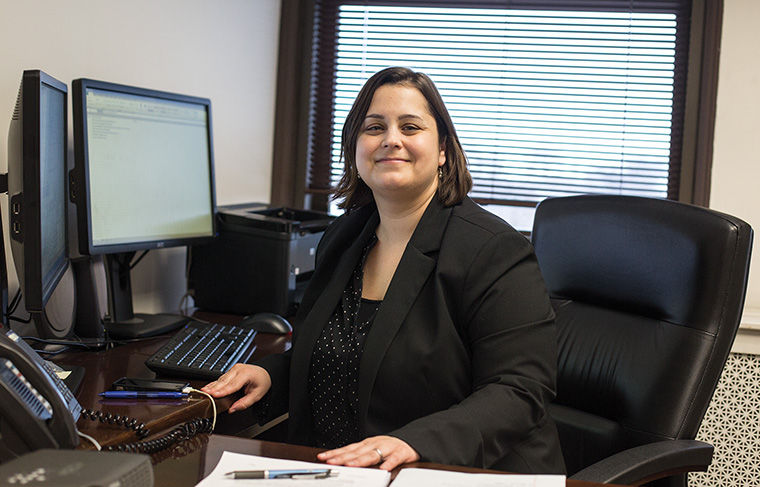SFS aims to educate students on finances
SFS aims to educate students on finances
March 9, 2015
With new leadership, students may see some changes to the Office of Student Financial Services in the near future.
Since starting at the college on Feb. 2, Cynthia Grunden, assistant vice president of Student Financial Services, said she has been working on new initiatives to help teach students to better manage their finances.
Grunden said she has spent her first weeks at the college meeting with departments and administrators to learn the college’s institutional goals and to plan her future initiatives. Grunden said she plans to develop a Student Financial Services office that is more actively involved with the student community, and the office itself is in the early stages of planning a program promoting “financial literacy” collegewide.
Grunden said financial literacy includes learning how to budget, understanding student loans, how to evaluate personal goals and figuring out how money is needed to achieve those goals.
“We [haven’t had] a comprehensive approach to assessing students’ financial literacy needs and bringing that to students in a way that is meaningful to them [and] useful,” Grunden said.
Grunden said she also wants to ensure all students are prepared with a practical plan to pay for their education.
“We see a lot of students who struggle to pay their tuition bill and end up with a financial hold,” Grunden said. “A lot of that is a lack of understanding and planning on the student’s part. That’s something that we as an institution should be doing a better job of—proactively reaching out to students.”
Grunden said she hopes to work with the Student Government Association as a way to reach out to students. Sara Kalinoski, a sophomore art and material conservation major and SGA president, said she is open to collaborating with SFS.
Kalinoski said affordability is one of the top concerns of the SGA and it wants Columbia students to be better educated on budgeting their money.
“Understanding what student options are and how to make college more affordable is extremely important. Everyone should know that,” Kalinoski said.
Cristian Rivera, a freshman creative writing major, said he has received help from SFS in the past regarding his scholarships and financial aid. He said while it may not be the biggest concern on students’ minds, they need to know there are consequences to lacking a financial plan.
“[College students] have friendships to explore, environments to grasp, [and] aspirations to achieve,” Rivera said. “I believe a financial concern should be taking place, even though it’s not your No. 1 concern.”
Grunden said she thinks students will be receptive to financial advice from the college, but she is still trying to figure out what will be the best approach to bring this information to students and plans to try out various avenues.
“What we need to do is help students learn the value of this kind of information and that it’s not something to be afraid of and to be avoided, but also find ways to deliver it so it’s not terrible and tedious for students to learn about,” Grunden said.
This future initiative is needed at Columbia and has the full support of the administration, said Stan Wearden, senior vice president and provost.
Learning how to create a financial plan is necessary for college students nationwide, Wearden said. Grunden is a good addition to the college’s staff because of her extensive experience in the subject, he added.
“We have not done an effective job of helping students with financial literacy as other institutions do,” Wearden said. “Now that Cynthia is here, we’re going to be able to see some real changes in that.”
SFS made dramatic improvements in the past 10 years regarding educating students about money, said Mark Kelly, vice president of Student Success. He said he is confident that Grunden will continue these improvements.
Kelly said he plans on working with the assistant vice president and her future initiatives. This information is essential for students to know, especially before they begin taking classes freshman year, he said. Kelly added it is the college’s responsibility to help students understand the difficulties of paying for an education.
“At times we have students that enter Columbia who are naive to the challenges [and] costs of a college education,” Kelly said. “Columbia wants to be far more aggressive in connecting to those students so they don’t come in with that naivete.”
Wearden said helping students to better understand their financial situation could also improve Columbia’s retention rates.
“More students will complete their degrees [and] will complete their degrees in a more timely manner,” Wearden said.
Grunden said she wants Columbia students to know that paying for an education is a worthwhile investment both personally and financially.
“I went to college for a very long time, paid a lot in tuition, and I don’t regret one dollar of that investment because it prepared me to be productive at work and prepared me to think about things in different ways,” Grunden said. “That’s very much what Columbia is offering to students and I think that’s a great investment in one self.”








